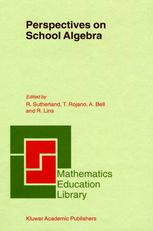

Most ebook files are in PDF format, so you can easily read them using various software such as Foxit Reader or directly on the Google Chrome browser.
Some ebook files are released by publishers in other formats such as .awz, .mobi, .epub, .fb2, etc. You may need to install specific software to read these formats on mobile/PC, such as Calibre.
Please read the tutorial at this link: https://ebookbell.com/faq
We offer FREE conversion to the popular formats you request; however, this may take some time. Therefore, right after payment, please email us, and we will try to provide the service as quickly as possible.
For some exceptional file formats or broken links (if any), please refrain from opening any disputes. Instead, email us first, and we will try to assist within a maximum of 6 hours.
EbookBell Team

4.7
26 reviewsThis book confronts the issue of how young people can find a way into the world of algebra. The contributions represent multiple perspectives which include an analysis of situations in which algebra is an efficient problem-solving tool, the use of computer-based technologies, and a consideration of the historical evolution of algebra. The book emphasises the situated nature of algebraic activity as opposed to being concerned with identifying students' conceptions in isolation from problem-solving activity. The chapters emerged from a working group of the International Group for the Psychology of Mathematics Education. The authors are drawn from an international community and the work highlights the differences in school algebra around the world. The group invited Nicolas Balacheff to write a provocative postscript and he suggests that `there is no possible entrance to the world of algebra without a strong push or guidance from the teacher, because there is no natural passage from the problématique accessible from the child's world to the mathematical problématique'.